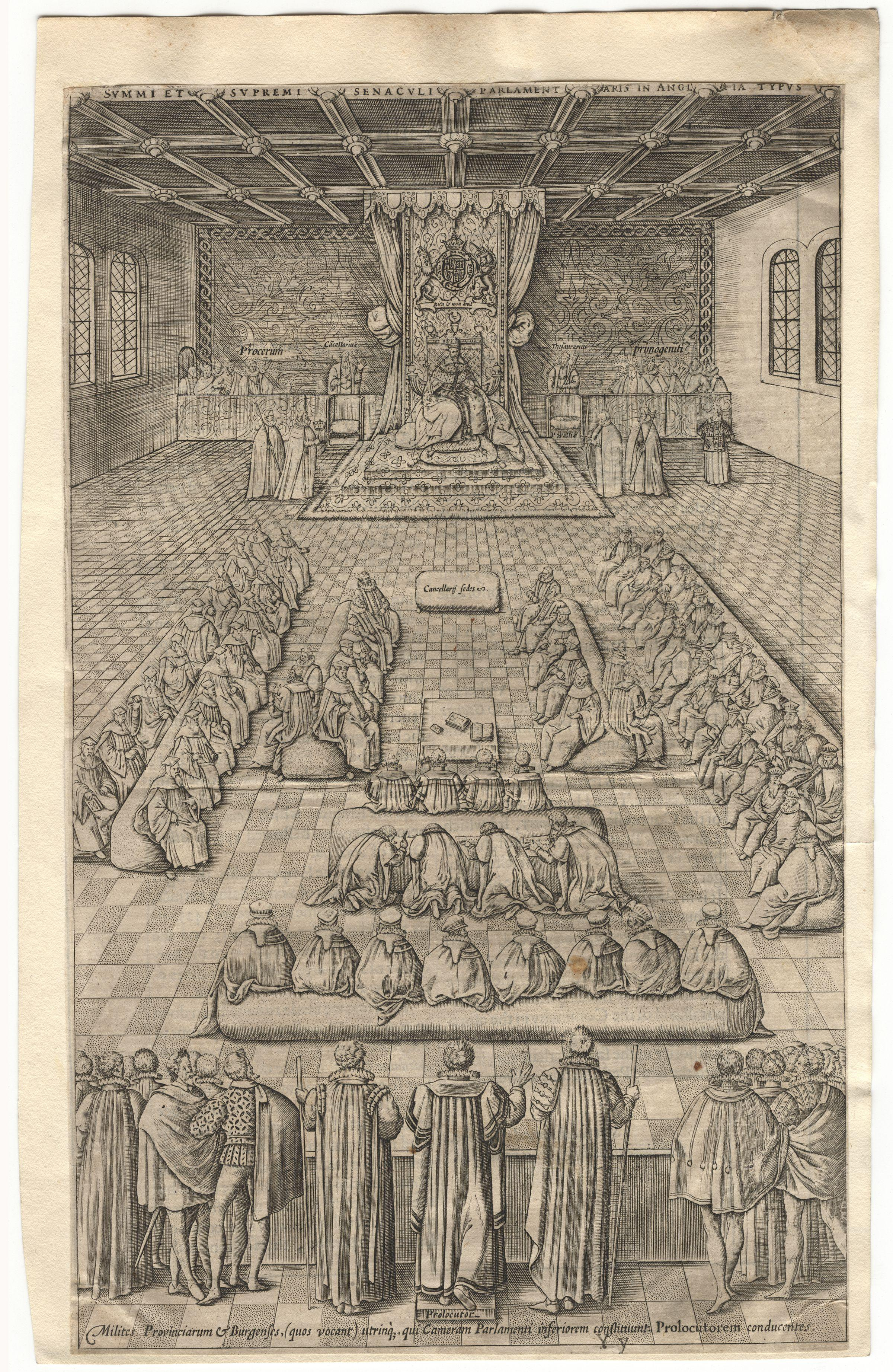‘Subject’ entered the English language from multiple sources, including the classical Latin subiectus, which indicated a subordinate or dependent individual ruled by a monarch or sovereign state, and from the Anglo-Norman suget, suject, and its variants. The subject’s political, legal and social identities thus had a long tradition in England, whose foundations were firmly rooted in common and civil law. Dating as far back as the thirteenth century, the ‘subject’, as position and identity, was legally defined through a complicated mixture of both ‘soil and blood’.[1] Early modern subjecthood had its foundations in medieval ideas of territorial allegiance, established at birth. The thirteenth-century English jurist and cleric Henry de Bracton acknowledged this when he suggested that foreign-born subjects of another king could not be heard at an English court ‘as an Englishman is not heard, if he implead any one concerning lands and tenements in France’.[2] This meant that allegiance, and subsequently subjecthood, was ‘based on territory – not by virtue of land one owned, but because of the monarch in whose land one was born’.[3] Bracton’s definition of subjecthood highlighted the common law tradition in England from which jus soli (‘right of the soil’) stemmed from. On the other hand, the idea of jus sanguinis (‘right of blood’), which had its roots in civil law, also fashioned English legal perceptions of subjecthood.
Passed during the reign of Edward III, the statute of De natis ultra mare highlights how these two legal traditions operated in conjunction in English law. [4] The law, which according to Kim Keechang was passed to guarantee the status of the children of the king’s soldiers born abroad, stated that those children who were born outside England but whose ‘fathers and mothers, at the time of their birth’ were English would have and ‘enjoy, the same benefits and advantages’ as their parents.[5] As Polly J. Price has shown, the act ‘permitted children to acquire subject status by birth according to descent’, fusing together the two legal forms.[6] The statute did ultimately weigh in favour of jus soli, however, as a child could only obtain subjecthood through the blood of English-born parents. This was further entrenched in 1368, when Parliament responded to a petition that requested that children born in the king’s overseas territories should be able to inherit as those born in England.[7] The act ensured that anyone born in the sovereign's territories outside England were entitled to the same rights and status of those born in England.[8]
During the sixteenth and seventeenth centuries, with the spread of print, authorities used the printing press to encourage godly meditation in ways that reinforced the connection between dutiful subjects and allegiance to the Crown. Printed sermons propagated obedience to the monarch, extending God’s sovereignty to that of his appointed monarchs on earth. The Book of Common Prayer cemented this allegiance into the practice of the state Church, declaring that ‘Almighty God, whose kingdom is everlasting...rule the heart of thy chosen servant Edward the sixth, our king and governour...that we his subjects (duly considering whose authority he hath) he faithfully serve, honour, & humbly obey him, in thee, and for thee’.[9] The image at the start of A booke of Christian Prayers (1578) placed a pious Elizabeth within the history of salvation and Protestant providentialism, her own loyalty to God serving as an inducement for her subjects to do the same by obeying her.[10]
From a legal perspective, however, the implications of the 1368 act ‘remained in doubt’ and consequently the definition of the ‘subject’ remained legally blurred until debates resurfaced in 1608 with the legal battle popularly known as ‘Calvin’s case’.[11] In 1608, some of the greatest legal minds in England, including Francis Bacon and Edward Coke, gathered at the Exchequer Chamber in London to deliberate a case that had initially seemed like a simple matter of property inheritance. The case deliberated whether the three-year-old Robert Calvin (actually called James Colville), who had been born in Scotland to Scottish parents, could inherit property in London under English common law. The decision of the twelve judges, two of whom dissented, would have enormous implications for issues of subjecthood, birthright and allegiance in the English-speaking world for centuries to come. The judges decided that Scottish children, known as the postnati (born after the Scottish King James VI inherited the throne of England in 1603), had the legal right under English law to be considered English subjects. In doing so Calvin’s case ‘mapped out the precise borders of English refusal’ to extend subjecthood to all the king’s Scottish subjects by considering the ‘status of a particular subset of Scottish subjects’ – the postnati.[12]
This was hugely significant. The ruling affirmed ideas of jus soli, based around an enduring bond between subjects and the monarch, in which children of immigrants were granted subjecthood as a natural birthright through their connection to the monarch. If a child born in Scotland after the union pledged allegiance to the Scottish Crown, then they also pledged allegiance to the English Crown by proxy. Coke’s decision to blur the boundary between ‘status and place of origin’ meant that subjecthood became fully portable.[13] This allowed the English state to hold subjects accountable to the English monarch no matter where in the Crown’s individual dominions they went. As the Lord Chancellor Thomas Egerton noted during the case, ‘diversities of Lawes and Customs makes no breach of the unities of obedience, faith and allegiance, which all liege subjects owe to their liege King and Sovereign Lord’.[14]
Calvin’s case and the debates surrounding questions of the Scottish union firmly defined the subject’s identity around his or her relationship, or allegiance, to the Crown. Liegance or allegiance was the ‘personal bond prevailing between the natural person of the King and the natural subject wherever he or she might reside in the kings domains’.[15] This relationship between sovereign and subject was a bond that transcended the political, legal, and geographic obstacles and destinations that existed between those domains and tied both parties together. Coke clearly defined the bond as one where the subjects ‘are bound to obey and serve’ their sovereign, whilst monarchs ‘should maintain and defend’ their subjects.[16] This raised significant questions about whether the individual subject’s allegiance was rightfully and naturally aligned with the sovereign of their place of birth. Furthermore, the ruling addressed whether, and how, non-subjects (like those born before James VI ascended the throne of England, the antenati) could become English subjects. Commentators such as Bacon and Coke dealt with the former by defining the issue of the king’s two bodies (the king’s ‘natural’ or physical self, and his political body, or the state).[17] Bacon suggested that the monarch’s natural and political bodies were inseparable: the king's ‘two capacities are in no sort confounded…[A]s his capacity politic worketh so upon his natural person… so e converso’.[18] As such, a subject who pledged allegiance to James of Scotland also did so to James of England, allegiance given to both at the same time.
Although Calvin’s case was influential in structuring early modern ideas perceptions and the rights of subjecthood, it did not fully settle these rights about who could be and could become a subject. On several occasions throughout the seventeenth century, court cases expanded and contracted the definition of subjecthood. In Rex v. Eaton (1627), a child born outside of England to an English merchant and Polish mother had the rights of a subject extended to him. Crucially, the case makes a point about rights pertaining to both genders, in the sense that the judges argued that de natis required only one parent, who could be either the mother or the father, to be English.[19] Legal cases in 1641 and 1664 reinforced this.[20] In Bacon v. Bacon (1664), the daughter of an English merchant born after his death also to a Polish mother was considered an English subject.[21] In 1666, the House of Lords considered a bill that concerned the rights of Richard, son of Richard Fanshawe, the king’s ambassador to Spain, who had died in Madrid. On his deathbed, Fanshawe, concerned about the status of his Spanish-born son, ordered that he be naturalized upon his return to England.[22] The request was referred to the Lords, who declared that ‘the children of Ambassadors (employed by the King), born in foreign countries, are no aliens’ but subjects of the king of England.[23] In 1677, Charles II also sought to extend the status of ‘subject’ to children born abroad to parents who had fled England during the Interregnum. The Naturalization (Children Born Abroad during the Troubles) Act ensured that any persons born outside of England between 14th June 1641 and 24th May 1660 ‘whose fathers or mothers were natural born subjects of this realm, are hereby declared…to be and to have been the King’s natural born subjects of this Kingdom…as if they had been born in England’.[24] Similar action was again taken in 1698 to ensure that children born to English soldiers fighting William III’s wars in France were guaranteed the rights of a subject.[25]
In the years after the ‘Glorious Revolution’ of 1688, the ‘subject’ developed a slightly different identity. The relationship between the individual, the state, and the Crown had shifted as Parliament and its rights, privileges, and position, became more secure. The rights of subjects were increasingly formalized, and allegiance considered contractual. Following the flight of James II, Parliament resolved that James had broken the ‘original contract’ with his subjects ‘abdicating the government’ and leaving the throne ‘vacant’.[26] The language used by Parliament marked a shift to a new constitutional order epitomized by the political philosopher John Locke’s ‘social contract’ theory, which holds that ‘legitimate government only exists by the consent of those governed’.[27] Opposed to the idea of the king's two bodies, Locke argued that every man was born free according to natural law, and as such they were free to choose to whom they were subject rather than being allocated subjecthood upon birth. Locke suggested that rather than owing allegiance to a father from birth as the head of the household, ‘the subjection due from a child to a father took not away his freedom from uniting into what political society he thought fit’.[28]
In doing so, Locke transferred the agency in the contractual act of subjugation from the ruler to the subject. The 1689 Bill of Rights established a contract between subject and Crown that declared ‘the rights and liberties of the Subject’ and reinforced the authority of Parliament as the body that represented the Crown's subjects.[29] By listing Parliament’s grievances towards James II, the Bill of Rights set out to define the rights of English subjects and secure Parliament's prerogative to protect those rights and ensure they were not violated. The Bill of Rights marked a shift from early modern to modern perceptions of the subject. No longer was the subject defined by their allegiance to the Crown, but by a contractual agreement set out in distinct rights that were enshrined in legislation and protected by those bodies elected by them. In this sense, the subject remained subjected to two bodies, but no longer were they both the Crown’s. One remained the Crown’s whilst the other was Parliament’s, all three subjugated to each other in a contractual bond.


